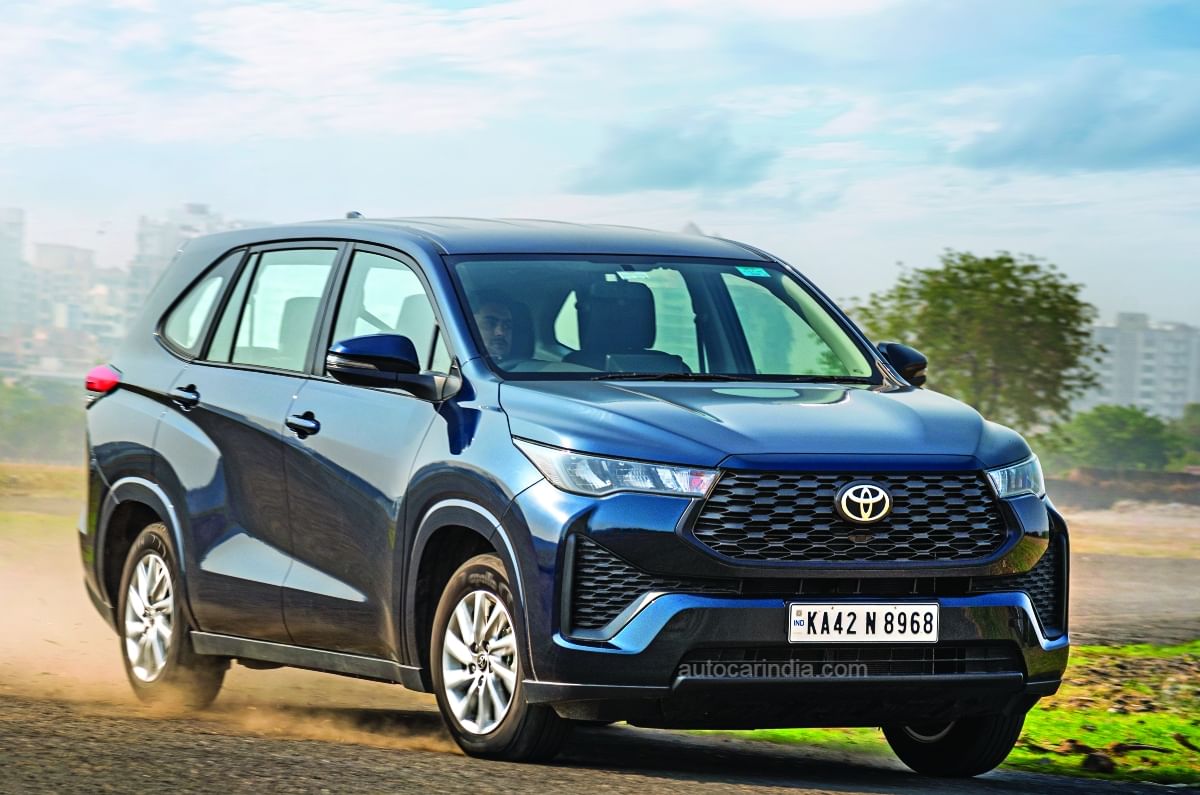- Introduction
- Design and engineering
- Interior
- Performance
- Fuel efficiency
- Ride and handling
- Verdict
- Tech Specs
Toyota Innova Hycross review, road test
To know if the Hycross carries forward the legacy of the Innova moniker, we put it through our comprehensive road test.
Published on Jun 20, 2023 08:00:00 AM
1,03,471 Views
Toyota is offering the Innova Hycross with a choice of two powertrains – a 2.0-litre hybrid and a 2.0-litre naturally aspirated petrol. What’s interesting is that, while the petrol and hybrid share the same 1,987cc, four-cylinder direct-injection engine, the latter runs a more efficient Atkinson cycle wherein the intake valves remain open for a longer during the compression stroke for a lean air-fuel mixture, which also explains why the hybrid’s petrol unit makes merely 188Nm of torque by itself, compared to the standard (non-hybrid) petrol’s 205Nm.
But while the engine might seem a bit down on torque in the hybrid version, it is complemented by an electric motor for brisk responses, so performance doesn’t feel lacking; in fact far from it. Powering the electric motor is a 1.6kWh nickel metal hydride (NiMH) battery, which as explained by Toyota engineers is their go-to option for heavier cars in the line-up, as it manages thermal runaway better than lithium-ion batteries; the latter being relatively more expensive and more suited to lighter, smaller cars.

By default, the Hycross starts on battery power and it’ll calmly potter around, with the petrol engine kicking in to recharge the battery or to provide an additional punch. Toyota claims that 50-60 percent of a typical urban commute is possible in full-electric mode, with the petrol engine playing a supporting role, however in peak summer, we noticed the air-con’s e-compressor levied tremendous load on the hybrid’s system. As a result, the petrol engine was running for the most part, which impacted fuel efficiency.
At higher speeds, it is the petrol engine that takes charge, and with the battery-motor’s electrical assistance, this 1715kg car feels responsive, and the hybrid makes light work of small increments in speed. With no spike or sudden surge, the Hycross’ acceleration is brisk yet very linear with none of that midrange oomph of a turbo-diesel. Impressively, flat-out acceleration from 0-100kph takes just 10.69sec, and it’ll even go on to hit a top speed of 170kph.
Toyota’s e-CVT (planetary gearbox) is at ease when driven sedately but with an aggressive driving style, it makes the engine feel strained, even though there’s more than enough performance on tap. There are paddleshifters on offer, so drivers can manually select six predefined ratios. These are mainly useful when you need engine braking, while going down a hill, to keep a check on the speed of the car. There are drive modes too – Power, Normal and Eco, and while there is a difference between them at part-throttle, with your foot pinned to the floor, performance is similar across the board.
The 170kg lighter petrol version tips the scales at 1545kg. Its 173hp, 2.0-litre naturally aspirated petrol impresses with its refinement and its vibe-free nature. The build-up of speed is smooth and it pulls cleanly till 6,500rpm, and feels sufficiently powerful for this people mover. Appreciably, even with a full load of passengers, it doesn’t feel dull or lacking. What’s also nice is its sprinting ability – it accelerates from 0-100kph in just 11 seconds and even hits a top speed of 175kph.
But what lets the drive experience down is its CVT (automatic) which groans and moans in protest every time you flex your right foot and demand more power. In fact, because the CVT sounds strained and protests rather vocally, drivers will be coaxed to adopt a sedate driving style and use the throttle with moderation. Like the hybrid version, the Hycross petrol also gets an Eco mode (no Power mode); however, on full throttle, performance in Eco and Normal mode is identical.
Related Videos
Copyright (c) Autocar India. All rights reserved.


